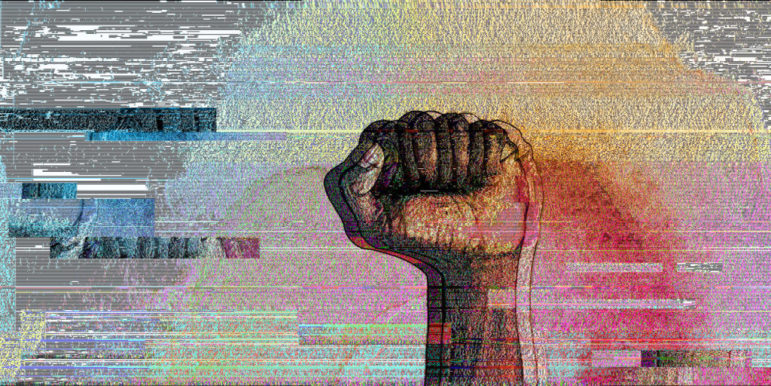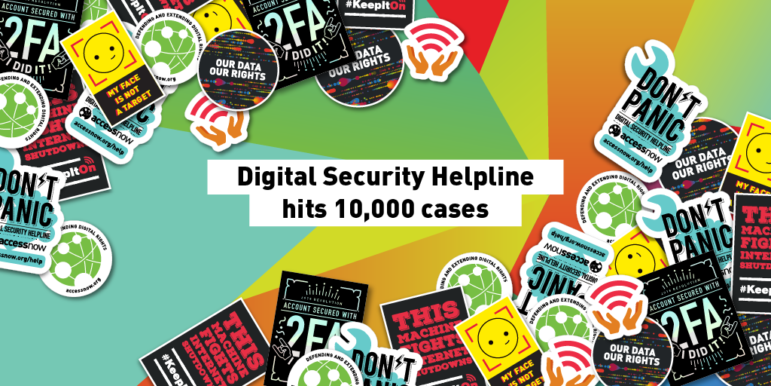
The global increase in LGBTQ+ intolerance is accelerating the digital repression of LGBTQ+ rights in Africa. Regional civil society organizations, impacted communities, and international human rights bodies are warning governments of the human rights impact of fostering such hostile environments. Yet authorities continue to persecute LGBTQ+ people, call for bans on LGBTQ+ content, incite violence, and introduce dangerous anti-LGBTQ+ laws and policies.
These actions dehumanize and isolate LGBTQ+ people from support networks, and allow human rights violations to be covered up. They also encourage intrusive intra-communal and state-sponsored policing techniques. This undermines everyone’s constitutionally affirmed rights to access information, free association, free expression, and other fundamental human rights.
This is why Access Now and our partners in Ghana, Kenya, and Uganda are closely monitoring and pushing back against these attacks. Join us to demand authorities protect and respect every person’s right to determine their gender identity and sexual orientation, guarantee equality and non-discrimination, and protect all people from violence on the basis of sexual orientation and gender identity, online and offline. African governments must hear our call: Protect LGBTQ+ rights: online, offline, everywhere.
TRACKING ANTI-LGBTQ+ LAWS IN AFRICA
Promotion of Proper Human Sexual Rights and Ghanaian Family Values Bill, 2021 IN GHANA
The bill, backed by a local conservative organization with ties to U.S. anti-LGBTQ+ lobby groups, has been described by leading human rights experts as constituting “an immediate and fundamental breach of Ghana’s obligations under human rights law.”
This draconian law seeks to expand the criminalization of LGBTQ+ people by requiring the public to report acts prohibited by the law to the police, as well as prohibiting actions such as engaging in LGBTQ+ allyship, advocacy to promote the human rights of LGBTQ+ people, public displays of affection among people of the same sex, and non-conforming expressions of gender and sexuality. It would also ban the publication of LGBTQ+ content online, and hold social media companies criminally liable for the prohibited content users publish on their platforms.
While current transparency reports from social media companies indicate that Ghana’s government did not issue any takedown requests in 2021, experts are still concerned about the capacity of the anti-LGBTQ+ law to enable law enforcement and social media companies identify and target people suspected of being LGBTQ+ or allies. The legislation also opens new risks to human rights: it threatens to promote disinformation, hate speech, and incitement to violence online, enable breaches of privacy, and facilitate censorship.
During the lengthy public participation process for the bill, activists, civil society, and experts appointed by the UN Human Rights Council all raised the alarm about the threat to human rights. Despite this, the Constitutional and Legal Affairs Committee of the Parliament of Ghana has nevertheless recommended its passage. This is dangerous. Since the bill was introduced in June 2021, activists have reported a sharp rise in acts of violence and intimidation. If the bill becomes law, it will leave LGBTQ+ people unprotected and cut off from support in the face of ever-worsening persecution.
ANTI-HOMOSEXUALITY ACT 2023, IN UGANDA
This legislation has been described as one of the harshest anti-LGBTQ laws in the world. It would impose a 20-year prison sentence for people convicted of “promoting homosexuality,” which includes the publication of homosexual content, as well as “the use of electronic devices such as the internet, mobile phones or films for the purpose of homosexuality or promoting homosexuality.” The Open For Business Coalition, which includes tech companies such as Google, Microsoft, and Meta, is raising urgent concerns about the requirement to report those perceived to be LGBTQ+ to authorities.
These broad provisions could lead to the banning of posts expressing support for LGBTQ+ rights online, the use of LGBTQ+ dating apps, or the use of social media and digital communication platforms to facilitate advocacy and community organizing. It also threatens the right to privacy and encourages more self-censorship by LGBTQ+ people in order to avoid prosecution and reprisals. In March of 2023, police arrested six people suspected of homosexuality after an intimate video of them went viral on social media. If the anti-homosexuality bill becomes law, we will see more people suffer this kind of rights-violating persecution.
The bill was initially passed by the Parliament of Uganda in March of 2023. However, President Yoweri Museveni declined to assent to it and told Parliament to withdraw the clauses criminalizing people’s ability to identify as LGBTQ+. He further requested that the requirement of mandatory reporting of people suspected of engaging in “homosexual activities,”only apply to instances involving children or “vulnerable persons.” With these amendments, the bill was once again passed in the parliament in May of 2023, was approved by the president on 29th May.
Family Protection Bill, 2023 in Kenya
The bill was submitted to the Parliament of Kenya in March of 2023. This was triggered by the Supreme Court’s judgment affirming LGBTQ+ organization’s right to freedom of association, which sparked a wave of anti-LGBTQ rhetoric, paving the way for submission of the bill. It seeks to prohibit a variety of actions including public displays of affection between people of the same sex, participation in activities that change public opinion on LGBTQ+ issues, and the use of the internet, media, social media platforms, and electronic devices to “promote homosexuality.” It additionally requires mandatory reporting of the acts that it prohibits and places criminal liability on people who fail to report crimes that they have suspected or witnessed occurring.
This law adds to an already restrictive legal framework that provides an enabling environment for the violation of human rights. In 2020, the High Court of Kenya upheld the Kenya Film and Classification Board’s decision to ban the LGBTQ+ film Rafiki. The court stated that this decision was justified as the interference with freedom of expression was necessary due to the protection of public morals. Additionally, should the Family Protection Bill, 2023 come into force, the acts it prohibits would come into the scope of cybercrime, according to Section 46 of the Computer Misuse and Cybercrimes Act, 2018. This would give law enforcement the power to limit the constitutional right to privacy in order to monitor and intercept private communications during investigations as provided by Section 36 of the National Intelligence Service Act, 2012.
TYPE OF THREAT
Entrapment and arbitrary arrest
Entrapment is a tactic used by law enforcement authorities and malicious actors, where they use fake online personas to connect with LGBTQ+ people under false pretenses, often on dating apps or social media platforms. Also referred to as “catfishing,” this abusive technique facilitates unlawful arrest and persecution of victims and their community.
Country: Kenya
In Kenya, police officers reportedly use dating apps such as Grindr to catfish LGBTQ+ people and obtain intimate images and messages that can serve as evidence of “homosexual-conduct.” This conduct is criminalized under Section 162 of the Penal Code, which outlaws sex acts deemed “against the order of nature.” The authorities then use this digital evidence to threaten LGBTQ+ people with arrest or the public revelation of their sexual orientation. If people do not comply with police demands, they face threats such as detention, physical violence, sexual violence, or false criminal charges.
Police officers have also been known to storm into LGBTQ+ people’s homes or undertake “stop-and-frisk” searches of people they suspect of being LGBTQ+. During these incidents, they reportedly often confiscate and search people’s devices, gathering evidence to identify other LGBTQ people to arrest and charge for engaging in homosexual activities.
Doxxing
Doxxing is the act of publicly revealing a person’s private information, such as their phone number, home address, and intimate images, online without their consent. Malicious actors routinely use this tactic to harm LGBTQ+ people, through forced outing, humiliation, harassment, censorship, and violence.
Country: Ghana
Activists in Ghana report that LGBTQ+ people do not feel safe online. Malicious actors have infiltrated group chats that queer activists have created for the purpose of organizing safety, support, and rapid response for their communities. This has caused people in need of support to leave these spaces because they fear being outed or doxxed.
The stakes are high, and the situation is particularly dangerous as previous incidents of doxxing in countries like Uganda have led to attacks and violence, such as the murder of LGBTQ+ activist David Kato.
censorship
The censorship of LGBTQ+ content online has stifled the freedom of expression of LGBTQ+ people in Africa for a long time. Authorities have historically weaponized Colonial-era morality laws to issue directives to ban, restrict, and take down LGBTQ+ content on platforms such as YouTube and Netflix. The recent emergence of anti-LGBTQ+ legislations in Ghana, Uganda, and Kenya are set to deepen this already concerning trend.
Countries: Kenya, Uganda, and Ghana
Members of parliament in Ghana, Uganda, and Kenya are attempting to pass anti-LGBTQ+ laws that will ban communications on LGBTQ+ rights online. Recently passed cybercrime acts in countries like Ghana provide authorities with the ability to issue takedown requests or bans on illegal content. This will enable bans on public discourse on LGBTQ+ issues, block documentation of human rights abuses, and prevent access to essential information to the community. States in other regions have deployed tactics such as website blocking, restricting search engine results, and content takedown requests to implement similar directives.
Recent data shows that Twitter’s compliance with takedown requests from governments has increased alarmingly — raising questions about how Twitter and other social media companies will respond to takedown requests for LGBTQ+ content in Africa.
Cyber-Harassment
Cyber-harassment is a form of online abuse that malicious actors frequently use to attack, harm, and intimidate people from marginalized groups. This includes tactics such as threats, hate speech, and non-consensual distribution of intimate imagery.
Countries: Kenya and Uganda
Politicians, religious leaders, and media institutions have launched anti-LGBTQ+ campaigns that equate LGBTQ+ people with predators or groomers who coerce children, or economically disadvantaged or vulnerable people, into being queer. This hate speech and disinformation is central to coordinated anti-LGBTQ+ social media campaigns in countries like Uganda and Kenya. The campaigns have not only spread harmful and dangerous hate speech online, they have likely inspired offline protests opposing LGBTQ+ rights, some of which have forced LGBTQ+ people to flee their homes out of fear of violence.
Online violence and hate crime
LGBTQ+ people frequently face threats due to incitement and violence on the basis of actual or perceived sexual orientation or gender identity, both in digital spaces and offline. They are subjected to death threats, beatings, abductions, and verbal abuse, and are in some cases forced to undergo so-called conversion therapy.
Country: Ghana
In 2022, openDemocracy commissioned local researchers to investigate the proliferation of anti-LGBTQ incitement to hate and violence and anti-LGBTQ+ disinformation in Ghana since 2021. They recorded 138 instances of online reports and posts that were misleading, inaccurate, and incite hatred. Activists in Ghana also report that they have received death threats on social media due to their advocacy on LGBTQ+ rights. Hate crimes against LGBTQ+ people, such as public beatings, are also shared on social media platforms.
GET INVOLVED
If you would like to join the fight against anti-LGBTQ+ legislations or get updates on developments, please reach out to: lgbtqcampaign@accessnow.org





